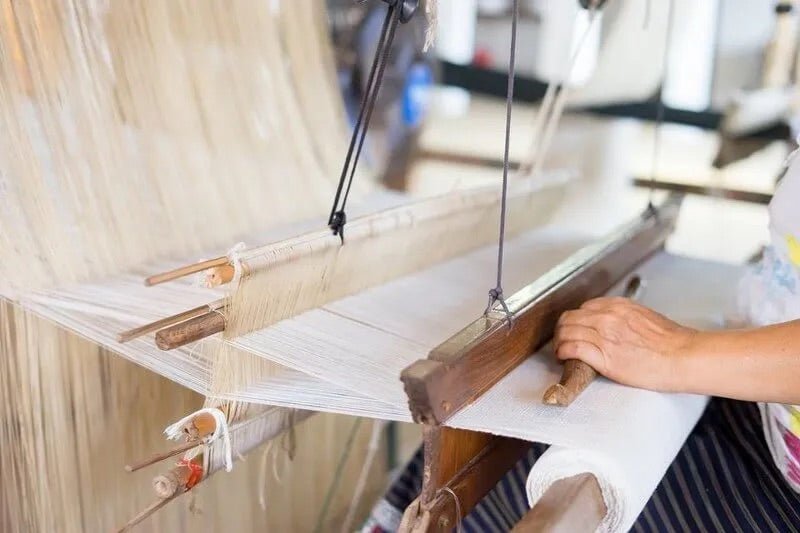Organic cotton fabric is becoming increasingly popular among eco-conscious consumers. But what exactly is it, and why does it matter? In this post, we'll dive into the science behind organic cotton fabric and explore its production process, as well as the benefits of choosing this sustainable option over conventional fabrics. If you're looking to make more environmentally-friendly purchasing decisions, keep reading!
What is Organic Cotton Fabric?
Cotton plants grown without the use of synthetic pesticides or fertilizers make organic cotton fabric. Instead, farmers rely on natural and sustainable methods such as crop rotation and companion planting to maintain soil fertility and reduce water consumption. This results in a product that is both environmentally-friendly and healthier for consumers.
Organic cotton fabric is environmentally-friendly, healthier for consumers and undergoes rigorous testing to ensure sustainability.
Certified organic cotton fabrics, such as those produced by Cloud9 or Birch, undergo rigorous testing to ensure they meet strict standards for sustainability and ethical production practices. By choosing organic cotton fabrics over conventional options, eco-conscious consumers can make a positive impact on the environment while enjoying high-quality textiles that are safe for themselves and their families.
Growing Methods
We reflect our commitment to sustainable and eco-friendly practices in our growing methods. We only use non-GMO seeds, ensuring that the cotton we grow is completely natural. Additionally, we follow strict crop rotation practices to ensure that our soil remains healthy and fertile.
We are also proud to say that we never use synthetic pesticides or fertilizers on any of our crops. Our commitment to organic farming has earned us certified status by several organizations such as Birch and Cloud9, guaranteeing the quality of our organic cotton fabric. By choosing organic cotton, you can make a positive impact on the environment while enjoying high-quality products that are good for you and the planet.
Benefits of Organic Cotton Fabric
Organic cotton fabric is not only good for the environment but also beneficial for farmers and consumers. Certified organic methods are used to grow it, eliminating the use of harmful pesticides and making it healthier for everyone involved in its production and processing. This means that you can enjoy soft, high-quality fabric without worrying about exposure to chemicals or other toxins.
Another benefit of organic cotton fabric is its durability. Clothing items made from this material last longer than those made from conventional cotton because they are more resistant to wear and tear. This saves you money in the long run while reducing your carbon footprint by consuming less clothing overall. In addition, producing organic cotton uses less water than traditional methods, which helps to preserve our birch forests and natural resources such as freshwater reserves. Cloud9, a popular brand known for their ethical practices in sourcing materials, including certified organic cotton fabrics, prioritizes sustainability in their company values, giving customers peace of mind when purchasing their products.
Environmental Impact
Organic cotton farming has a significantly lower impact on the environment compared to conventional cotton farming. This is because harmful chemicals, such as fertilizers and pesticides, are not used in organic farming practices. As a result, less pollution from these chemicals enters our waterways and surrounding ecosystems. In addition, organic cotton production requires less use of fossil fuels which helps to reduce greenhouse gas emissions.
Pesticide-free farming also allows for maintaining biodiversity in soil and surrounding ecosystems. Certified brands such as Cloud9 prioritize ethical and sustainable production methods that promote responsible land use while protecting natural habitats like birch forests where animals can thrive alongside crops.
Choose Organic Cotton Fabric for a Healthier Planet
By choosing organic cotton fabric over conventionally produced options, eco-conscious consumers can help support these efforts towards a healthier planet for us all to enjoy.
How is Organic Cotton Fabric Produced?
Producers prioritize sustainability and ethical practices when producing organic cotton fabric. The first step involves carefully selecting organic cotton seeds, which they grow in healthy soil without using chemical fertilizers or pesticides. Farmers must also implement effective weed control and pest management techniques to protect the crops.
Once matured, the cotton plants are harvested by hand to avoid damaging the fibers, ensuring high-quality raw material for processing. During production, organic cotton undergoes minimal treatment with natural dyes and finishes to retain its softness and purity while minimizing environmental impact. By choosing organic cotton fabric, eco-conscious consumers can support sustainable agriculture practices while enjoying luxurious fabrics at home or on-the-go.
Seed Selection and Soil Preparation
Non-GMO seed selection is the foundation of organic cotton fabric. When selecting seeds, it’s important to choose non-genetically modified organisms (GMO) in order to ensure that the crop has not been genetically altered in any way. Crop rotation practices also play a key role in soil preparation for organic cotton farming. By alternating crops each growing season, farmers can improve soil fertility and reduce pest infestations without relying on synthetic pesticides or fertilizers. Using natural fertilizers such as compost or manure further supports healthy soil and plant growth while minimizing harmful environmental impact.
Weed Control and Pest Management
Hand weeding methods, beneficial insect introduction and neem oil as a natural pesticide are some of the most effective ways to control weeds and pests in organic cotton farming. Hand weeding is labor-intensive but it allows for precise removal of weeds without harming the surrounding crops. Introducing beneficial insects like ladybugs or lacewings can help control harmful pest populations naturally. Additionally, neem oil, derived from the seeds of the neem tree, acts as a natural pesticide that disrupts pest behavior while leaving no harmful residue on plants.
- Hand weeding:
- precise removal of weeds without harming other crops.
- Beneficial insect introduction:
- introduces predators to naturally control pest populations.
- Neem oil:
- botanical extract with pesticidal properties that leaves no harmful residue on plants
Harvesting and Processing
Mechanical harvesting techniques, chemical-free processing methods, and water conservation measures are essential components of producing high-quality organic cotton fabric. Mechanical harvesting eliminates the need for manual labor while reducing soil damage and allows for faster crop rotation. Chemical-free processing methods ensure that harmful substances do not come into contact with the final product. Lastly, water conservation measures aim to reduce waste in irrigating crops.
Some practices used for mechanical harvesting include using strippers or pickers that separate the cotton from its plant without damaging it. The use of these machines also reduces soil disturbance caused by traditional methods such as handpicking or machine plucking. Additionally, manufacturers can implement chemical-free processes such as using enzymes to break down cellulose fibers instead of harsh chemicals like chlorine bleach.
Water conservation measures involve utilizing drip irrigation systems which apply precise amounts of water directly to the roots rather than blanket watering entire fields. These systems help minimize water waste while still providing sufficient moisture necessary for healthy growth.
Why Choose Organic Cotton Fabric?
Choosing organic cotton fabric is not only good for the environment, but also for your health. Organic cotton is produced without the use of harmful chemicals and pesticides that can have negative effects on our skin and respiratory systems. Additionally, organic cotton farming promotes healthier soil and water sources, contributing to a sustainable future for all.
Not only does choosing organic cotton benefit your personal health, it also supports social responsibility efforts towards fair labor practices. Organic cotton farmers are often paid fair wages and work in safe conditions, promoting ethical treatment of workers in developing countries. By supporting brands that prioritize ethical production processes, consumers can make a positive impact on communities around the world while enjoying high-quality textiles.
Health Benefits
Organic cotton fabric is a game-changer when it comes to health benefits. Not only is it free from harmful chemicals and pesticides, but its natural properties enhance our well-being too. Its breathability makes for comfortable wear all day long, while its hypoallergenic nature reduces the risk of skin irritation and allergies.
Moreover, organic cotton's sustainable production practices ensure that there are no chemical residues, making it safe for both human consumption and environmental impact. So by opting for this eco-friendly alternative in your clothing choices, you're not only doing yourself a favor but also contributing to the greater good of our planet's health.
Social Responsibility
Organic cotton farming is not only better for the environment, but it also promotes fair labor practices. By eliminating the use of child labor and providing workers with safe working conditions, farmers can produce high-quality cotton without sacrificing human rights or dignity. Choosing organic cotton supports sustainable farming practices that conserve water resources as well as biodiversity in ecosystems. This means that by purchasing organic cotton fabric, you are supporting a healthier planet and ethical business practices.
In addition to promoting fair labor practices and sustainability, organic cotton production also helps reduce greenhouse gas emissions associated with conventional farming methods. This reduction is due to less dependence on synthetic fertilizers and pesticides used in traditional farming techniques. As consumers become more environmentally conscious, choosing organic cotton fabric over conventionally grown options can make a significant impact on reducing carbon emissions and preserving our planet for future generations.
Economic Impact
The growing demand for organic cotton presents a significant market opportunity for farmers who want to transition from traditional methods to more sustainable ones. By adopting eco-friendly practices, they can tap into an emerging consumer trend that favors environmentally responsible products. Moreover, investing in ethical fashion made from organic clothing contributes positively towards building a circular economy, where waste is minimized by reusing and recycling resources.
Another economic benefit of choosing durable products made from high-quality materials like organic fabrics is the potential cost savings over time. While these products may be initially pricier than their conventional counterparts, their longevity means fewer replacements are needed in the long run. As consumers become increasingly aware of the environmental impact of fast fashion and disposable culture, investing in durable and sustainable options becomes a smart choice financially as well as ethically.
Conclusion
Organic cotton fabric is not only better for the environment, but it's also safer and more comfortable for you. The production process of organic cotton doesn't involve any harmful chemicals or pesticides, which can cause health issues in people who wear clothes made from conventionally grown cotton. Investing in organic cotton fabric means investing in your own health and well-being while supporting a more sustainable future.
Making the switch to organic cotton may seem like a small decision, but it has a big impact on our planet and the people who live on it. By choosing eco-friendly fabrics, we are creating demand for products that prioritize sustainability and ethical practices. It's up to us to make conscious choices as consumers that will pave the way towards a healthier and happier future for all.

